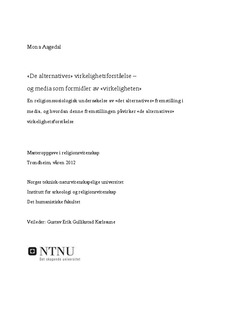| dc.description.abstract | This paper is a study in the sociology of religion on how New Age is presented in the media, and how this affects the «New Agers’» perception of reality. We have analyzed three examples from the media, where we look at how New Age is presented in different ways. The first example is two TV-shows in the New Age genre. In one of these shows people who claim they have a so called «sixth sense», compete against each other in various exercises to find out who has the best developed sixth sense. In the other show we meet people who are experiencing odd things in their houses, and they get help from so called mediums to get rid of what is in most cases identified as ghosts or spirits.
The second example is Norway’s princess Märtha Louise, and her so called «angel school». We look at a variety of online newspaper articles which present a different angle on the subject. Many of these articles have a lot in common with the last example, which is the campaign Nobody likes to be fooled. In this campaign the skeptics argue against New Age, and especially against alternative medicine.
While the last two examples portrait New Age (mostly) as something negative and unreal, the first example shows a different perspective. In this «reality» ghosts, spirits and the sixth sense really exists. The last two examples use science to undermine New Agers perception of reality, and even the New Agers them selves, represented by the first example, try to incorporate scientific elements in to their reality to seem more convincing.
To see how the media affects the New Agers, we have interviewed some of them, and we analyze their answers, broken down in themes; their perception of reality, prejudice and stereotypes, their thoughts on science, the economic aspect, media’s role, their unwillingness to talk about New Age, and the role of significant others.
The results of these inquiries show that the media’s presentation of New Age is mostly negative and doubting, but some show a positive and confirming picture. And while the media might not affect the New Agers perception of reality directly, they nourish prejudice in our society, which lead to the New Agers not talking about their beliefs. Them not talking about it could lead to a weakening of their perception of reality. We found that age and gender could matter in how easily the New Agers are affected by society’s prejudice. The males and the older interviewees seemed more confident with their perception of reality, than the younger females. Significant others who share the same perception of reality might be more important than the media in shaping the New Agers perception of reality. | nb_NO |
